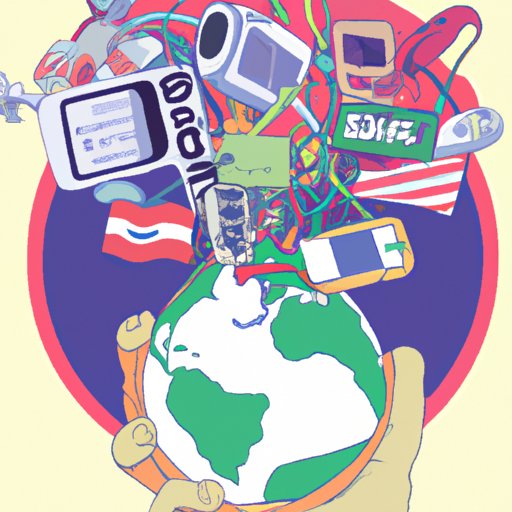Introduction
Cultural imperialism is a term used to describe the process by which one culture dominates or influences another. It can be understood as a form of power imbalance, where certain values, beliefs, and ideologies are imposed on an unwilling population by a more dominant culture. This often leads to the suppression of local customs and traditions, and can have a significant impact on the people living within these cultures.
A Historical Perspective
The concept of cultural imperialism has been around for centuries, though its exact definition has evolved over time. In its simplest terms, it can be defined as the spread of a particular culture’s values, beliefs, and ideologies to other countries or regions. This can be done through colonization, military conquest, or economic and political domination.
One of the earliest examples of cultural imperialism was the Roman Empire, which spread its language, religion, and customs across Europe, North Africa, and the Middle East. In more recent times, European powers such as Britain and France have been accused of using their colonial empires to impose their own values and beliefs on other countries. Similarly, the United States has been accused of using its economic and military might to promote its own version of democracy and capitalism in other parts of the world.

Cultural Imperialism in the Digital Age
In the modern era, the concept of cultural imperialism has taken on a new dimension with the rise of digital technology. Social media platforms, streaming services, and other digital tools have opened up new avenues for the spread of cultural ideas, values, and norms. This has allowed powerful countries and corporations to influence populations in far-reaching ways, with little regard for the local cultural context.
For example, American companies like Google, Facebook, and Apple have been accused of using their products and services to impose their own values and beliefs on users around the world. This includes everything from the way they design their user interfaces to the types of content they allow on their platforms. In this way, these companies have been able to wield a great deal of influence over how people think and act.
In addition, the proliferation of technology has enabled governments and corporations to collect vast amounts of data about individuals, which can then be used to tailor messages and advertising to specific audiences. This has allowed them to target vulnerable populations and manipulate public opinion in order to further their own interests.
The Power of Popular Culture
Popular culture is also an important factor when it comes to cultural imperialism. Movies, television shows, music, and other forms of entertainment can have a powerful influence on people’s values and beliefs. This is especially true when it comes to American media, which is often seen as being synonymous with Western culture.
American movies and television shows are particularly influential when it comes to shaping values and beliefs. These programs often portray a particular version of the world, which may not be accurate or representative of the actual situation. This can lead to a distorted view of reality, and can be used to promote certain values and beliefs while ignoring or downplaying others.

The Effects of Cultural Imperialism
The effects of cultural imperialism can be felt in many different countries and regions around the world. In some cases, it can lead to the loss of traditional customs and values, as well as the erosion of local cultures. This can have a negative impact on populations, as it can lead to a sense of alienation and displacement.
In addition, cultural imperialism can lead to economic inequality and exploitation, as powerful countries and corporations use their influence to gain access to resources and markets. This can lead to unfair trade practices and the exploitation of workers, as well as the destruction of local economies.
Countering Cultural Imperialism
Given the far-reaching effects of cultural imperialism, it is important to find ways to resist and counter it. One way to do this is through education and awareness-raising. By understanding the history and implications of cultural imperialism, people can be empowered to challenge and resist it.
In addition, it is important to promote cultural diversity and understanding. This can be done through cross-cultural exchanges and dialogue, as well as through the promotion of multiculturalism and respect for different cultures. By celebrating and embracing diversity, we can help to create a more tolerant and inclusive world.
Conclusion
Cultural imperialism is a complex and far-reaching phenomenon that has been around for centuries. In the digital age, it has become increasingly pervasive, with powerful countries and corporations using their influence to shape values and beliefs around the world. The effects of cultural imperialism can be felt in many different countries, leading to the erosion of local cultures and the exploitation of vulnerable populations.
It is important to recognize the problem of cultural imperialism and to take steps to counter it. This can be done through education and awareness-raising, as well as through promoting cultural diversity and understanding. By doing so, we can help to create a more tolerant and inclusive world.
(Note: Is this article not meeting your expectations? Do you have knowledge or insights to share? Unlock new opportunities and expand your reach by joining our authors team. Click Registration to join us and share your expertise with our readers.)
